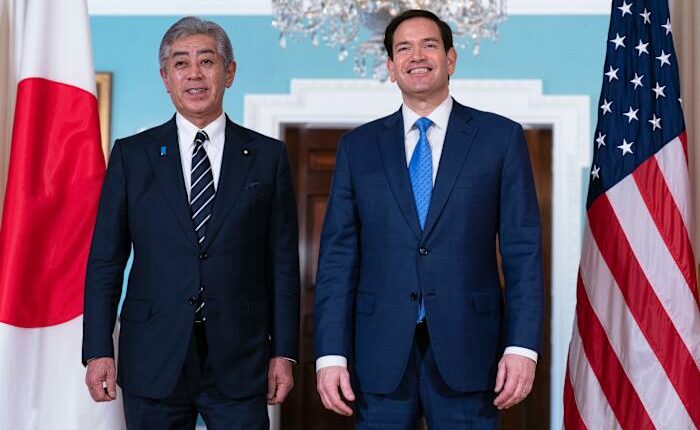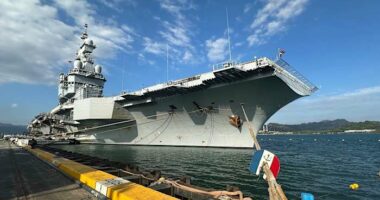Share this @internewscast.com

WASHINGTON – With plans in motion for President Donald Trump to implement extensive tariffs next month, his lead diplomat’s maiden voyage to Asia could face challenges. This comes at a time when the U.S. is striving to strengthen its ties with Indo-Pacific countries to counterbalance China’s rising dominance in the area.
On Monday, Trump alerted numerous nations about the upcoming increase in tariffs, should they not agree to trade conditions with the U.S. This announcement was made just a day before Secretary of State Marco Rubio was set to embark on an official visit to a regional security summit in Malaysia, focused on Southeast Asia.
The event, known as the Association of Southeast Asian Nations Regional Forum, will occur in Kuala Lumpur with Rubio’s attendance on Thursday and Friday. Representatives from at least eight nations singled out for the impending tariffs, scheduled to begin on August 1st, will be present.
State Department officials say tariffs and trade will not be Rubio’s focus during the meetings, which the Trump administration hopes will prioritize maritime safety and security in the South China Sea, where China has become increasingly aggressive toward its small neighbors, as well as combating transnational crime.
However, Rubio may be hard-pressed to avoid the tariff issue that has vexed some of America’s closest allies and partners in Asia, including Japan and South Korea, which Trump says would face 25% tariffs absent a deal. Neither of those countries is a member of ASEAN but both will be represented at the meetings in Kuala Lumpur.
Rubio’s “talking points on the China threat will not resonate with officials whose industries are being battered by 30-40% tariffs,” said Danny Russel, vice president of the Asia Society Policy Institute and a former assistant secretary of state for East Asia and the Pacific during the Obama administration.
“In fact, when Malaysian Prime Minister Anwar Ibrahim last week said ASEAN will approach challenges ‘as a united bloc’ — he wasn’t talking about Chinese coercion, but about U.S. tariffs,” Russel said.
Among ASEAN states, Trump has so far announced up to 40% tariffs on at least six of the 10 members of the bloc, including the meeting host Malaysia, which would face a 25% tariff mainly on electronics and electrical product imports to the United States.
Southeast Asian countries not yet targeted by the U.S. include Brunei, the Philippines, Singapore and Vietnam, which recently agreed to a trade deal with Trump. The Trump administration has courted most Southeast Asian nations in a bid to blunt or at least temper China’s push to dominate the region.
In Kuala Lumpur, Rubio also will likely come face-to-face with the foreign ministers of two of America’s biggest adversaries: China and Russia. U.S. officials could not say if meetings with either are planned for the short time — about 36 hours — that Rubio will be in Malaysia.
Russel noted that Chinese Foreign Minister Wang Yi is a veteran of such gatherings and “fluent in ASEAN principles and conventions,” while Rubio “is a rookie trying to sell an ‘America First’ message to a deeply skeptical audience.”
Issues with both countries remain substantial, particularly over Ukraine.
Trump on Tuesday expressed his exasperation with Russian President Vladimir Putin, saying, “I’m not happy with him, I can tell you that much right now” as Moscow ramps up attacks in Ukraine amid the American leader’s push for a peace deal.
Trump also announced that the U.S. would resume providing Ukraine with defensive weapons after the Pentagon announced a surprise pause in some deliveries last week.
U.S. officials continue to accuse China of resupplying and revamping Russia’s military industrial sector, allowing it to produce additional weapons with which it can attack Ukraine.
Copyright 2025 The Associated Press. All rights reserved. This material may not be published, broadcast, rewritten or redistributed without permission.










